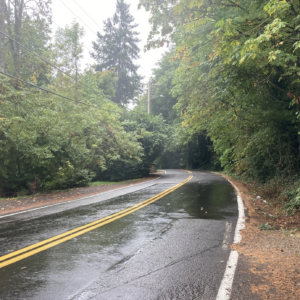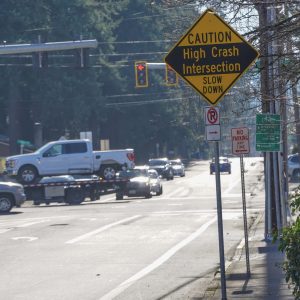— This article was written by Portlander Steve Gutmann. He works for the Portland Sustainability Institute and formerly worked for EcoSecurities and Flexcar.
On September 29th, California Governor Arnold Schwarzenegger signed legislation that will — for the first time — allow individuals in California to have their personal cars become car-sharing vehicles without invalidating their personal auto insurance. This legislation clears the way for “peer to peer,” (P2P) or personal vehicle car-sharing in California, and a similar effort is underway here in Oregon. This could dramatically accelerate the already rapid growth of car-sharing nationwide.
But why should you (a bike-riding audience) care?
As recently pointed out here on BikePortland, living completely carfree is rare in the US; in fact, even the most bike-centric households typically own a car. By making shared cars more common, peer to peer car-sharing could make it much easier to live without a vehicle — or with one fewer per household. And fewer cars means less congestion and more opportunities to re-allocate right of way to non-motorized vehicles.
So, what exactly is peer-to-peer car-sharing?
“By making shared cars more common, peer to peer car-sharing could make it much easier to live without a vehicle.”
P2P car-sharing is a new concept being pioneered by at least three companies in the U.S.: Spride, RelayRides and Getaround It’s just like traditional car-sharing as practiced by Zipcar and dozens of other companies, but it takes the concept to a new level by allowing private vehicle owners to securely rent their vehicles to pre-screened and qualified members of the club.
For example, if you own a car or a pickup truck and don’t need it all the time, you can equip it with car-sharing electronics, post its availability on an online reservation system, and rent it out to others. As the vehicle owner, you could set the rates. The hourly rent might, for example, be $6-$12/hour (depending on the make, model, age and condition of your car). Insurance and gas are included in the rate. A certain number of miles may also be included, or they might be billed separately. So instead of your car just sitting in your driveway or at your workplace and steadily depreciating, you could earn back some revenue. Like renting out an extra bedroom. Or a vacation home.
And whereas participants’ cars will end up with marginally more wear and tear on them, their owners could potentially earn back quite a lot of money. A typical car-sharing vehicle, for example, is rented at least 5 hours/day. If you rented your vehicle out an average of 3 hours a day – that’s 1 or 2 weekends a month and a couple of weekdays each week — you’d earn over $400 per month (assuming the carsharing operator takes 20%).
Not a bad way to earn back your car payments.
Whenever you need your car, you’d simply reserve the car for yourself — either “on the fly,” or every day during the hours that you typically drive it. And if your car is already checked out and you suddenly need to take a trip, you could simply rent any other car in the network.
Because of its ability to leverage the millions of under-utilized cars already on the street, not to mention its attractiveness to the hundreds of thousands of existing car-sharing members, some think peer to peer car-sharing could significantly increase the availability, convenience and popularity of car-sharing.
What are the prospects for P2P in Oregon?
State Senator Jackie Dingfelder is already working with car-sharing consultant Dave Brook to tweak Oregon’s laws to make sure peer to peer can happen in Oregon. She expects to introduce her bill for the next session in January.
Representative Ben Cannon also plans to push the P2P car-sharing idea this coming session. In response to a recent candidate survey taken by the Bicycle Transportation Alliance, Cannon wrote:
“I will introduce a bill this session that would aid in both formal and informal car sharing for those times that bike and transit-commuters need access to cars. These changes would also allow car owners who choose to bike commute to rent out their cars to neighbors and others, mitigating insurance and maintenance costs.”
Since the California legislation was quite straightforward (once the insurance industry and trial lawyers understood it) things should go smoothly in Oregon. Although it’s possible that the laws in other states do not specifically prohibit peer to peer carsharing, clarifying things by specifically addressing the issue can only help to reduce confusion.
— This article was written by Portlander Steve Gutmann. He works for the Portland Sustainability Institute and formerly worked for EcoSecurities and Flexcar.








Thanks for reading.
BikePortland has served this community with independent community journalism since 2005. We rely on subscriptions from readers like you to survive. Your financial support is vital in keeping this valuable resource alive and well.
Please subscribe today to strengthen and expand our work.
I don’t understand how my insurance even knows I’m using my car as a car-share… I’m already insured for anybody to be able to drive it, even total strangers… I already loan it out when my car-free (but licensed) friends need to get somewhere far like Salem…
Good question, Spiffy. My understanding is as follows:
If your insurance is like most, you can lend it out occasionally without invalidating your insurance. However, if you RENT your car to someone, or transport someone for a fee, that’s considered “livery” and may well invalidate your coverage if there’s an accident.
Dave Brook (who I’ll ask to weigh in as well) understands the insurance issues better than I do. I’ll ask him to weigh in as well.
I’m curious about the insurance issues, too. I take comfort in the safety net my own car insurance grants me as a pedestrian or cyclist (facing an uninsured or underinsured driver or a hit-and-run). It’s one of the drawbacks of giving up my car and fully committing to bicycle/Zipcar/rental car. I assume that only the owner of the share car would retain that benefit, but I’d love to know more.
Some creative insurance company ought to write a policy to cover exactly your situation. Maybe such a policy already exists.
Are there any insurance agents out there reading this who know?
I know that you can get “non-owners” insurance from a couple companies. The main purpose of this type of insurance is to cover you if you don’t own a car but do rent/borrow one occasionally. If you rent regularly it can be cheaper than getting the coverage that comes with a rental car. I don’t know whether it covers you when you are ped or cyclist.
Spiffy – As far as your insurance company knowing when your car would be earning money as a carshare, the answer is, they wouldn’t – at least until someone had an accident and you filed claim. Then they would want to make sure that it was being used the way you told them it would be when you got the policy.
That’s the purpose of clarifying what “commercial use” is in Oregon laws. The California law now says that p2p carsharing isn’t commercial if the rental transaction is managed by a p2p carshare company that is carrying its own insurance AND that the owner doesn’t earn any more revenue from renting the car than their actual expenses of owning it.
The insurance and oil industry will hate this new reform. What took so long is my only comment.
Answer: Moderate democrats like Gray Davis, ousted for saying he’s a democrat, but selling out to lobbyists. Arnold has been some trouble, but he’s a lot better than a moderate democrat. In just a few days the country will speak, even if they speak by staying home from the voting booth.
Joe – As part of the process I’m told that the insurance industry and trial lawyers signed off on the Calif. law changes to define/allow use of private vehicles for peer to peer carsharing. So it must not have been too threatening to them.
As someone who owns but rarely drives an older model 4wd pickup truck, this would be a great way to generate a little extra cash. I only keep it because it still runs fine and I wouldn’t get much for selling it.
I don’t even need anything as fancy as a service that screens people and takes reservations. Many of my neighbors have cars and let my car-free family borrow them regularly. But we all are a little bit on edge about the possible impact to their car insurance premiums if a crash were to happen. I have looked into getting stand-alone car insurance for our family even though we don’t have a car, so that we could borrow other peoples’ cars without jeopardizing them, but it’s really expensive.
Wow, what a great (and obvious) idea. I sometimes consider buying a car but I just don’t think it would be worth it considering how little I would use it. I think it would be cool if more things were available this route, like certain tools, etc. that are expensive and that most people don’t use on a consistent basis. How much money could we save while also doing less damage to the environment if only 1 in 10 people bought a lawn mower/chain saw/ angle grinder, etc.?
Jessica-
Your comments are true, and illustrate two things:
1) The fact that you can easily borrow a car without a reservation system highlights that here’s a massive oversupply of cars out there. In fact, the average car is idle about 23 of 24 hours. That’s a nearly 96% “vacancy rate.”
2) This is already happening in the “informal economy.” However, most people in our (more than a bit litigious) society aren’t comfortable doing what you and your neighbors are doing. Most people are leery of doing anything that might come back to haunt them in the form of a denied claim or a lawsuit.
Using a website, screening system, formalized insurance, etc. will hopefully shift “informal” P2P carsharing into the mainstream.
Hrm. I wonder if this could open the gate to formal car-sharing co-ops? A group owns the car together, each member gets a certain number of hours a month for their share of the payments/repairs and such.
I can’t imagine owning a car again without sharing it somehow.
Peer 2 Peer car sharing is not a new idea. I had it back in 2002, and told everyone I knew about it, and pleaded with the car sharing community back then to take it seriously. Unfortunately, I was totally ignored. If you don’t believe me, ask Dave Brook.
Daniel-
You’re right, this idea is not new at all. Like you, I thought of it years ago, when I was at Flexcar, and it went nowhere.
And like you, I learned that good ideas are only pipe dreams until someone gets the plan and the capital together to execute. At least three startups are now going for it. Maybe even Zipcar will jump in. There certainly aren’t many barriers holding them back.
So I could just go out and buy a couple of old beater cars and rent them out? Would I have to declare that income on my taxes?
Jim – The short answer about taxes is yes, it’s income – probably schedule C. One thing I hope is that local governments don’t require each car owner to get a business license, but think of P2P like rental property.
As far as buying some cars and renting them out, the concept put forth in the California law is that you can’t make more money than your actual expenses to own and maintain the car. It makes sense – if you were making more money than your expenses then it would be a “commercial use” of the vehicle.
If you make less money than your expenses can you claim it as a loss?
I’m not an accountant but my guess would be No, since it’s your personal vehicle. The worst-case would be that the IRS starts treating P2P like home offices with complex procedures for handling depreciation, etc. Don’t go there…
Any chance ZipCar members who gave up their personal vehicles could be eligible for a tax deduction for all the benefits to the environment and traffic congestion? Eh? Ehhhhh?
Nah, didn’t think so. We’ll save those for the job-creators at Tesoro and NW Natural.